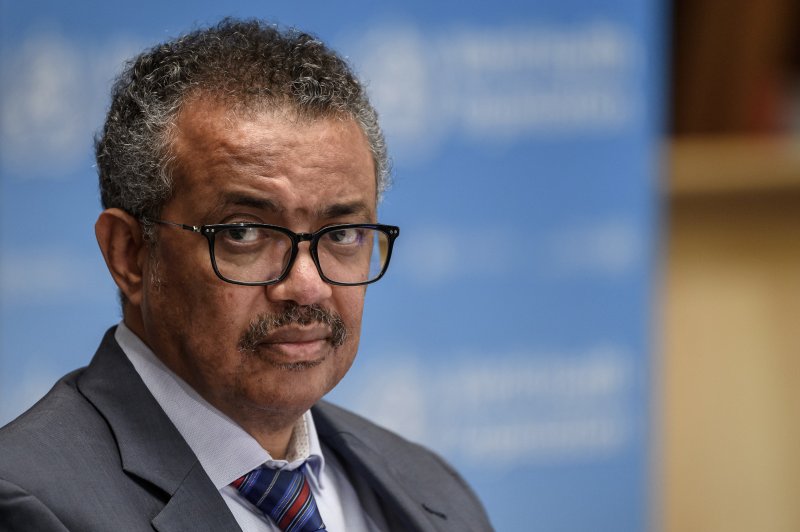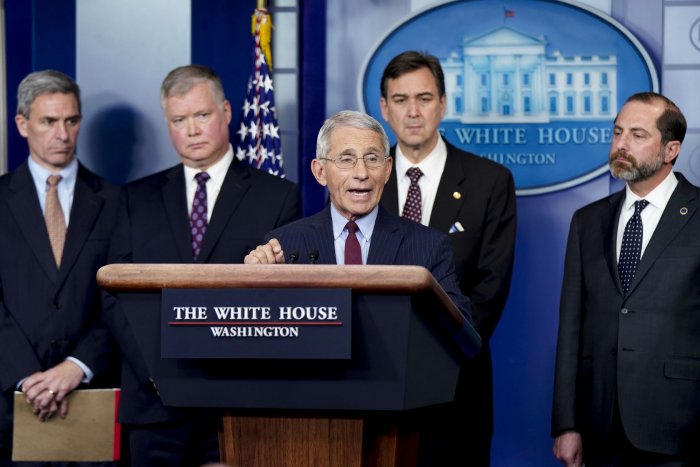World Health Organization Director-General Tedros Adhanom Ghebreyesus pleaded with rich countries on Monday to share vaccines with poorer countries if not out of morality then to do so out of their self-interest. Photo by Fabrice Coffrini/EPA-EFE
March 22 (UPI) -- World Health Organization Director-General Tedros Adhanom Ghebreyesus chastised rich nations on Monday for seeking to inoculate their entire populations against COVID-19 at the expense of lives in poorer countries, describing the inequitable distribution of vaccines as "becoming more grotesque every day."
"Countries that are now vaccinating younger, healthier people at low risk of disease are doing so at the cost of the lives of health workers, older people and other at-risk groups in other countries," he said during a press conference on Monday. "The world's poorest countries wonder whether rich countries really mean what they say when the talk about solidarity."
In mid-January, Tedros warned the world is on "the brink of a catastrophic moral failure," the price for which would be the lives and livelihoods in the world's poorest countries.
At the time, more than 39 million doses of vaccine had been administered to some 49 richer countries while one poorer nation had only administered 25, he said.
According to Oxford University's Our World In Data project, some 500 million doses have been administered, with the United States at 124 million doses and China at 75 million compared to Nigeria and the Bahamas who as of last week had administered 8,000 doses and 110, respectively.
By doses per 100 people, Israel led the world with 112.52. Nigeria, with a population of more than 200 million, was at zero and the Bahamas and Vietnam were at 0.03 doses.
COVAX, the WHO-led initiative to provide equitable access to vaccines, as of Monday has shipped some 31 million doses to 57 participating nations, including Ghana, Brazil, Uganda, Mali, Malawi and others.
Tedros warned Monday that this inequitable distribution was not simply a moral failure but was also misguided, with rich nations attempting to buy "a false sense of security" through rushing to inoculate their entire populations.
"The more transmission, the more variants and the more variants that emerge the more likely it is they will evade vaccines," he said. "And as long as the virus continues to circulate everywhere, anywhere, people will continue to die."
Trade and travel will continue to be disrupted, he said, and it will also undo economic recoveries.
Without naming any nation, Tedros appealed to them that if they weren't going share vaccines for "the right reasons" then do it "out of self-interest."
He praised South Korea, a wealthier nation that could have secured doses through deals inked directly with countries, for having "waited its turn" for those supplied through COVAX.
He also named pharmaceutical giant AstraZeneca as being the only COVID-19 vaccine manufacturer to commit to not profiting off of its medicine and for licensing its technology to other companies that have produced more than 90% of the vaccines distributed through COVAX.
"We nee more vaccine producers to follow this example," he said.
Since being inaugurated in January, U.S. President Joe Biden has committed $2 billion to COVAX.
In December, the People's Vaccine Alliance, a coalition of health and humanitarian organizations, accused richer nations of having "hoarded" vaccines, stating while dozens of poorer nations were for doses, the richest countries secured enough to inoculate their populations three-fold.
According to data curated by Johns Hopkins University, more than 123.6 million people have been sickened by the virus, including 2.7 million who lost their lives.
January 31, 2020
National Institutes of Health official Dr. Anthony Fauci (C) speaks about the coronavirus during a press briefing at the White House in Washington, D.C. Health and Human Services Secretary Alexander Azar (L) announced that the United States is declaring the virus a public health emergency and issued a federal quarantine order of 14 days for 195 Americans. Photo by Leigh Vogel/UPI |
License Photo
















